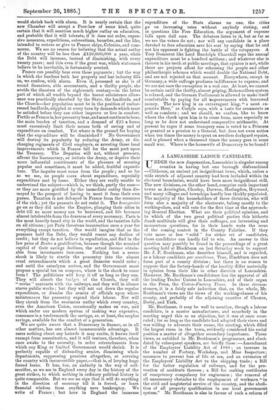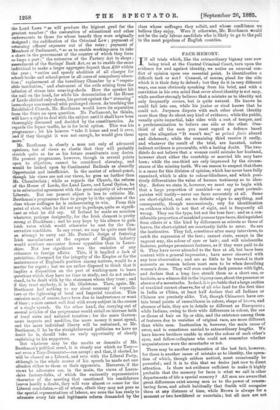A L ANCASHIRE LABOUR CANDIDATE.
UNDER the new dispensation, Lancashire is singular among counties in having but one borough disfranchised —Clitheroe, an ancient yet insignificant town, which, unless a
wide stretch of adjacent country had been included within its electoral boundaries, would have been more insignificant still.
The new divisions, on the other hand, comprise such important towns as Accrington, Chorley, Darwen, Haslingden, Heywood, and many villages and townships hardly less thickly populated. The majority of the householders of these divisions, who will form also a majority of the electorate, belong mostly to the working-class, and will vote for the first time at the approach- ing General Election. What are their political opinions, and to which of the two great political parties this hitherto dumb multitude will give their suffrages, are interesting and momentous questions, for in their hands rests the issue of the coming contest in the County Palatine. If they vote more or less " solid " for either set of candidates, those candidates can hardly fail to win. An answer to this question may possibly be found in the proceedings of a great meeting held at Blackburn on last Saturday week to support Mr. J. F. Boothman, who describes himself, and is regarded, as a labour candidate par excellence. True, Blackburn does not form part of a county division ; but there is no reason to suppose that the factory-hands of the locality differ materially in opinion from their like in other districts of Lancashire. Moreover, Mr. Boothman's candidature has the approval of all the leading Trades' Unions in Lancashire, and of their organ in the Press, the Cotton-Factory Times. In these circum- stances, it is a fairly safe induction that, on the whole, Mr. Boothman's views are the views of the working-classes of his county, and probably of the adjoining counties of Chester, Derby, and York.
Mr. Boothman, it may be well to mention, though a labour candidate, is a master manufacturer, and somebody in the meeting urged this as an objection, but it was at once over- ruled ; for so long as the candidate had adopted their views and was willing to advocate their cause, the meeting, which filled the largest room in the town, evidently considered his social position a matter of altogether secondary importance. These views, as unfolded in Mr. Boothman's programme, and eluci- dated by subsequent speakers, are briefly these :—Amendment of the Employers' Liability Act of 1880 ; an increase in the number of Factory, Workshop, and Mine Inspectors ; measures to prevent loss of life at sea, and an extension of the Employers' Liability Act to the shipping trade ; a Bill for the better regulation of railways, and for the pre- vention of accidents thereon ; a Bill for making certificates of competency compulsory for enginemen ; the removal of all unnecessary obstacles to the employment of workmen "in the civil and magisterial service of the country, and the aboli- tion of all property qualification in our local government system." Mr. Boothman is also in favour of such a reform of the Land Laws " as will produce the highest good for the greatest number ;" the restoration of educational and other endowments to those for whose benefit they were originally designed ; the codification of the Criminal Law ; payment of returning officers' expenses out of the rates ; payment of Members of Parliament, " so as to enable working-men to take a share in the government of the country of which they form so large a part ;" the extension of the Factory Act to shops ; amendment of the Savings' Bank Act, so as to enable the same individual to make a larger aggregate deposit than £30 within the year ; " entire and speedy abolition of all charges for sehool-books and school-pence in all cases of compulsory educa- tion ;" replacement of the hereditary Chamber by a "respon- sible institution," and abatement of the evils arising from the infusion of steam into weaving-sheds. Here the speaker hit the nail on the head, for while his denunciation of the House of Lords elicited only cheers, his protest against the" steaming" loom-shops was received with prolonged cheers. As touching the Established Church, Mr. Boothman would leave its separation from the State an open question. No Parliament, he thinks, will have a right to deal with the subject until it shall have been thoroughly discussed and decided by the constituencies. As regards the liquor traffic, he is for local option. This was his programme ; let his hearers " take it home and read it over, and if they thought it was not enough, he would give them more."
Mr. Boothman is clearly a man not only of advanced opinions, but of views so elastic that they will probably stretch quite as far as his future constituents may desire. His present programme, however, though in several points open to objection, cannot be considered alarming, and would be looked upon by Continental Radicals as absurdly Opportunist and insufficient. In the matter of school-pence, though his views are not our views, he goes no further than Mr. Chamberlain ; while as regards the Church, the reform of the House of Lords, the Land Laws, and Local. Option, he is in substantial agreement with the great majority of advanced Liberals. But our present object is less to criticise Mr. Boothman's programme than to gauge by it the opinions of the class whose suffrages he is endeavouring to win. From this point of view, what he did not say is, perhaps, quite as signifi- cant as what he did say. Of Ireland he made no mention whatever, perhaps designedly, for the Irish element is pretty strong at Blackburn ; and he may hope by his silence to gain Irish votes which would otherwise be cast for the Con- servative candidate. In any event, we may be quite sure that an attempt to carry out Mr. Parnell's design of fostering Irish manufactures at the expense of English industry would nowhere encounter fiercer opposition than in Lanca- shire. Not less significant was the omission of any reference to foreign affairs. This, if it implied a lack of patriotism, disregard for the integrity of the Empire or for the maintenance of England's position among nations, would be a matter for regret ; but we are rather disposed to think that it implies a disposition on the part of working-men to leave questions which they have no time to study, and do not under- stand, to be dealt with by the statesmen whom they trust ; and if they trust anybody, it is Mr. Gladstone. Then, again, Mr. Boothman had nothing to say about economy of expendi- ture or the lightening of local and Imperial taxation. This omission may, of course, have been due to inadvertence or want of time ; a man cannot well deal with every subject in the course of a single speech. On the other hand, the carrying out of several articles of the programme would entail an increase both of local rates and national taxation ; for the more Govern- ment inspects and meddles, the more money it must spend, and the more individual liberty will be restrained, as Mr. Boothman, if he be the straightforward politician we have no doubt he is, should take an early opportunity of clearly explaining to his supporters.
But whatever may be the merits or demerits of Mr. Boothman's political creed, it is clearly one which no Tory— not even a Tory-Democrat—can accept ; and that, if elected, he will be classed as a Liberal, and vote with the Liberal Party, although in the whole course of his speech he made not one allusion either to them or their opponents. Moreover, if the views he advocates are, in the main, the views of Lanca- shire factory-folks, of which the eminently representative character of the meeting that sanctioned his candidature leaves hardly a doubt, they will vote almost en masse for the Liberal candidates,— all of whom, albeit they may not pose as the special representatives of labour, are none the less ready to advocate every fair and legitimate reform demanded by the class whose suffrages they solicit, and whose confidence we believe they enjoy. Were it otherwise, Mr. Boothman would not be the only labour candidate who is likely to go to the poll in the most populous of English counties.



































 Previous page
Previous page